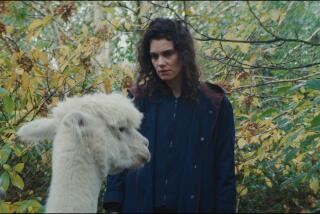BOOK REVIEW / NOVEL : A Complex, Yet Idyllic, Story of Childhood in Vermont : NORTHERN BORDERS <i> by Howard Frank Mosher</i> ; Doubleday $22.95, 291 pages
- Share via
Childhood, as anyone in its throes will tell you, is a complex and important phenomenon. As adults, however, that’s not how we remember our early years; we tend to romanticize youthful experience because it defines the adults we become, shapes our hopes and choices and temperaments to such a degree that we cannot reject our younger selves without simultaneously rejecting our mature identities. When push comes to shove, who among us would trade our own childhood for the apparently more satisfying childhood of another?
That should be a rhetorical question, but in “Northern Borders” Howard Frank Mosher has written a novel that will have readers lined up hundreds deep at the Childhood Exchange window. The childhood of Austen Kittredge III doesn’t sound very promising at first--who’d want to be sent away to the backwoods of northern Vermont to be raised and treated essentially like a farmhand by one’s grandparents?--but few readers will have reached page 50 in this truly radiant novel without wanting to be that young man.
Austen works long and hard all year, is mistreated at school, has few friends and becomes a weapon in his grandparents’ decades-old, never-ending marital dispute, yet the dozen years he spends in Lost Nation Hollow, Kingdom County, are an idyll nonetheless. Austen, who narrates this novel as an adult, somehow knew even as a 6-year-old that he was privileged to have lived in a community of independent, admirably forthright people, a community that the electrical age would soon render extinct.
“Northern Borders” consists of 10 chapters, each of which is a self-contained short story focused on a particular character or incident. To summarize these chapters would be a disservice to the novel, however, for no synopsis could capture their complexities, and would imply, moreover, that the novel’s main attraction is the eccentricity of its characters: the animal-loving farmer who buys an elephant at the county fair to prevent it from being shot, the aunt with a pearl-handled revolver who’s rumored to have robbed a bank, the enormous schoolteacher who spends most of her class time drinking gin and punishing students with head- and arm-holds picked up from television wrestling.
Such characters do greatly enliven the book, but it’s the voice of Austen Kittredge III--observant, respectful, steadfast, direct--that makes the novel sing.
Austen was sent to Kingdom County because a Kittredge ancestor--a British sympathizer who settled in Lost Nation Hollow during the War of Independence under the impression that it was actually in Canada--had donated land to Vermont with the proviso that graduates of the local “Atheneum” could attend the state college free of charge. The boy is at first ambivalent about leaving his widowed father, and his fears are not alleviated by the discovery that his grandparents are involved in what the natives know as “Ab and Austen Senior Kittredge’s Forty Years’ War.”
Grandmother Abiah refers to her marriage to the elder Austen as the time she “fell afoul of Mr. Kittredge”; Grandfather Austen, for his part, is understood to see Abiah as his “wife and implacable adversary.” Young Austen quickly takes to both of them, however, loving his grandmother’s reverence for books and anything Egyptian--she calls her grandson Tut, thinking he looked at birth like “the doomed young pharaoh”--and his grandfather’s willful, principled individualism, which leads the grandfather to change the course of the river in his own back yard and to take his grandson on a grueling, two-month canoe trip into unchartered parts of Labrador.
The ongoing battle between Ab and Austen provides the novel’s backbone, most chapters at least referring to some grandparental skirmish--Ab’s desire to shoot the snowy owl that’s killing her prize-winning chickens, Austen’s determination to free a logjam above his sawmill and thereby flood Ab’s apple orchard, the family reunions and holidays for which Ab works overtime and Austen refuses to attend.
Young Austen tells these stories without taking sides, amused by the conflict but conscious that the constant battles keep his grandparents alert and attentive and above all interdependent. Mosher doesn’t leave the relationship at that, though: By the book’s close we have learned of Ab’s and Austen’s difficult childhoods, and why they settled, however uncomfortably to the casual observer, for such a frightful alliance.
Ab’s story is revealed in the penultimate chapter, when she wears herself out trying to rid the farmhouse--using an electrical device, a vacuum, for the first time--of a cluster-fly plague. Austen’s is told in the final chapter, in the course of the Labrador canoe trip, which turns out to have much greater significance than he initially lets on. These two chapters are the most effective in the novel, and make clear why it’s so good--because Mosher has constructed the book like sedimentary rock, each chapter a stratum in young Austen’s life and the layers becoming more dense, more profound, as the novel progresses.
The result--thanks largely to Mosher’s light touch--is that although you may begin “Northern Borders” thinking of it as a typical seriocomic novel, you will likely end it thinking of “Huck Finn.” Mosher, author of four other novels (including “Where the River Flows North,” recently made into a movie), with this one has written a contemporary classic.
More to Read
Sign up for our Book Club newsletter
Get the latest news, events and more from the Los Angeles Times Book Club, and help us get L.A. reading and talking.
You may occasionally receive promotional content from the Los Angeles Times.









